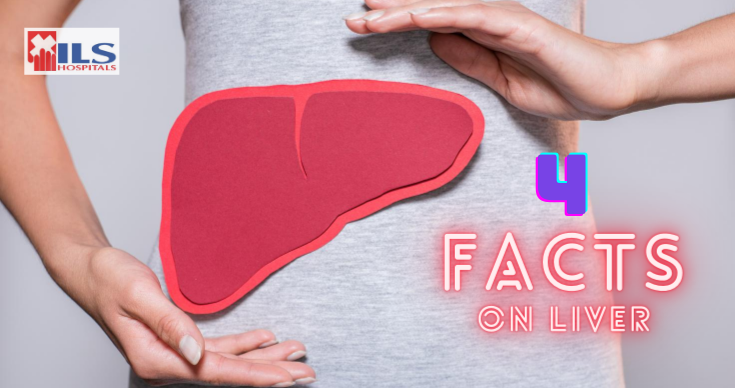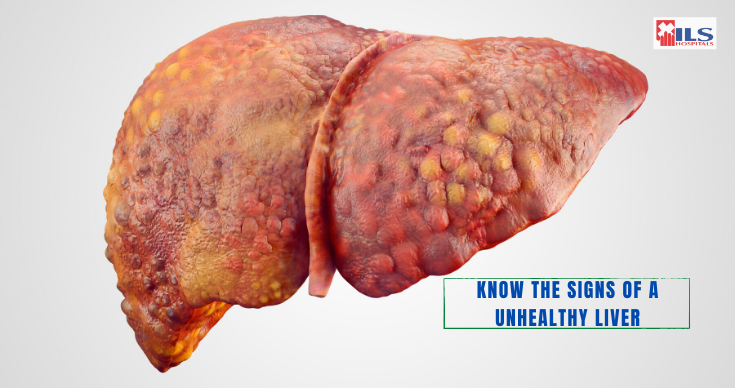4 Outstanding Facts On Liver By The Best Hospital In Kolkata
A liver is an amazing organ that requires no further introduction. Your liver performs essential functions, like detoxifying the body and storing vital nutrients.
Recommended Read: Signs Of A Liver That’s Damaged And Requires Liver Treatment
Today, ILS Hospitals, one of the best hospitals in Kolkata and Agartala will tell you 4 outstanding facts on liver so stay connected!
Your liver can regenerate itself
Yes, you heard that right. It’s an absolutely correct statement. A liver can completely regrow itself from 25% to 100 % in a matter of weeks. When a person donates 75% of his or her liver then the liver can regenerate itself to its original size in two weeks without fail.
Healthy liver = Well-functioning brain
Your liver regulates plasma glucose and ammonia levels in the body. If these two enzymes are not regulated then it will lead to a serious medical condition called hepatic encephalopathy (declined brain function) that can result in a coma. So, yes, admit it, a healthy liver is crucial for a healthy brain.
Liver is important for drug metabolism
Oral medicines are first converted by the liver for the body to accept and if your liver does not or is unable to perform this vital function then no matter how much effective the oral medicines are, they just won’t work.
Our liver is the second largest organ in the body
The liver weighs more than 3 pounds and is the second-largest organ in the body. So, which one is the first largest organ? Well, it’s your skin.
Since the liver is such a superstar organ, it needs great care and love. An unhealthy liver can lead to serious liver ailments, like fatty liver disease and cirrhosis. If you want your liver to be young and healthy, then take note of the following things:
- Eat a healthy and balanced diet
- Maintain a healthy weight
- Ditch your sedentary lifestyle
- Avoid hepatitis B and hepatitis C infections
- Quit smoking
- Drink alcohol moderately
- Get regular medical checkups
If you need liver treatment in Kolkata and Agartala, consider ILS Hospitals. Our several healthcare units in Kolkata and Agartala aim to provide accurate and effective liver treatment.
Signs Of A Liver That’s Damaged And Requires Liver Treatment
The liver is our body’s most significant organ. The liver’s primary function is to filter the toxins in our body. A healthy liver is an ultimate way to a healthy body. If your liver is unable to filter your body’s toxins, then the build-up of toxins can get into your bloodstream and affect other organs.
When the liver gets damaged, it definitely requires prompt and accurate liver treatment. Your liver will always show you early signs of damage without fail. Today, ILS Hospitals, one of the best multispeciality hospitals in Kolkata and Agartala will discuss signs of a liver that’s damaged and requires prompt liver treatment.
1st Sign – Poor Appetite
If you have chronic loss of appetite then it can indicate serious liver disease, cirrhosis.
2nd Sign – Sudden change in weight
The second sign of liver damage is the sudden and drastic change in body weight. Either you lose or gain weight unintentionally.
3rd Sign – Fatigue
If you find yourself tired for no reasonable reason, it might be due to any underlying liver condition. Fatigue is one of the most common and early signs of liver damage.
4th Sign – Yellow Skin Or Eyes
Yellow skin or eyes is the primary symptom of jaundice. However, the skin can become yellow even due to hepatitis B infection or cirrhosis.
5th Sign – Dark Urine
In case of liver damage, the urine becomes dark or brown-coloured.
6th Sign – Pale or Dark Stools
The stool’s colour is given by liver enzymes, bilirubin and bile salts. If your stools are pale or dark then there’s something wrong with your liver.
7th Sign – Fluid Retention
Fluid retention happens in almost all patients of cirrhosis. If you experience swelling or puffiness in your abdomen, ankles, and legs, visit a good liver specialist.
8th Sign – Red Palms
Red palms usually happen due to NAFLD (Nonalcoholic Fatty Liver Disease).
If you notice the above signs of liver damage in your body, get accurate liver treatment from expert liver specialists. At ILS Hospitals – Kolkata and Agartala, we provide economical liver treatment to our patients.
A Brief Introduction on Hepatitis on This Hepatitis Day
LIVER – one of the vital organ that performs many crucial functions of the living body. This includes its role in facilitating digestion, filtering toxins from the body, breaking down of fat and carbohydrate, removal of bilirubin, cholesterol, aiding in the blood clotting, synthesis of albumin etc. It is always advised to receive proper liver treatment in case of any discomfort or malfunction of the liver occurs.
We are observing World Hepatitis Day on 28th July. So, let’s have a look at the 5 different hepatitis types in brief.
Hepatitis, in general, is a condition that is characterized by inflammation of the liver. These occur mostly due to the viral infections, but can also onset due to high dosage of alcohol, drugs, medicines etc. Autoimmune hepatitis is a special case, in which it onsets when the body produces antibodies against the liver tissue.
The 5 common types are Hepatitis are A, B, C, and D and E, where a different type of virus is responsible for each type.
Hepatitis A
It is caused by Hepatitis A Virus (HAV). It gets transmitted through consumption of food and water contaminated by feces from a hepatitis A infected person.
Hepatitis B
It is caused by the Hepatitis B Virus (HBV). It is transmitted by coming in contact with infectious body fluids from a hepatitis B infected person. It also can spread by using common blades or razor.
Hepatitis C
It is caused by the Hepatitis C Virus (HCV). It transmits through direct contact with infectious body fluids from a hepatitis C infected person. It typically spread through needles or intimacy with an infected person.
Hepatitis D
It is also known as the Delta Hepatitis and is caused by the Hepatitis D Virus (HDV). It transmits through direct contact with infected blood from a hepatitis D infected person. It usually onsets in conjugation with Hepatitis B.
Hepatitis E
It is caused by the Hepatitis E Virus (HEV). Being a waterborne disease it transmits through water contaminated by fecal matters. It typically spreads in an area with poor sanitation.
In conclusion, Hepatitis A is always short term but highly acute, whereas type B, C, D, and E, mostly onsets as long termed and chronic. Type E gets equally acute and pose severe threats if infects pregnant women.
Despite the type and its degree of severity, it is best not to endure discomforts due to malfunctioning liver and seek quality liver treatment on time.












